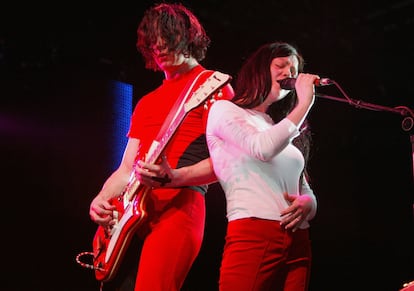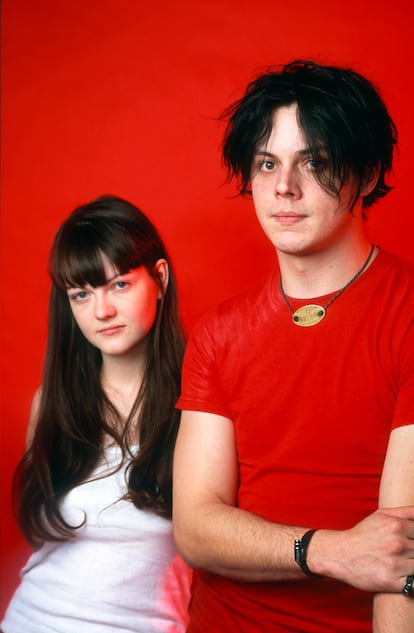‘Seven Nation Army’, the hit song that jumped from indie clubs to far-right campaigns
The White Stripes’ most iconic track began in underground clubs, found its way into football stadiums by sheer chance, and was eventually appropriated by political groups

There’s probably no one in the world who hasn’t heard the song, but few know its origins. Seven Nation Army was the first single from Elephant (2003), the fourth album by the Detroit rock duo The White Stripes. Jack and Meg White had built a growing reputation in the garage rock scene, initially at a fairly underground level. With their third album, White Blood Cells (2001), they gained more widespread popularity and became one of the trendiest bands of the so-called New Rock Revolution, sparked by The Strokes.
Seven Nation Army marked a turning point for the band, not only because it became an instant hit — winning a Grammy Award for Best Song — but also because its guitar riff took on a life of its own. Today, it is the most searched riff on Google, surpassing classics like Led Zeppelin’s Stairway to Heaven and Deep Purple’s Smoke on the Water. With nearly 2 billion plays on Spotify, if you could tally up all the renditions of the iconic “lo lo lo lo lo lo lo” chant sung worldwide, only “Happy Birthday” might top it.
A football song back and forth between Belgium and Italy
Although Seven Nation Army became famously associated with Italy’s national football team, its roots lie with fans of the Belgian club Brugge. According to journalist Tom Scocca in Deadspin, the story begins in October 2003, ahead of a Champions League match between Milan and Brugge. While enjoying a few beers at a bar, Brugge fans heard The White Stripes’ song and found it so infectious that they began humming the tune.
They continued singing the song into the streets and eventually into the San Siro stadium. When Andrés Mendoza scored the decisive goal to secure Brugge’s unexpected victory, the chant erupted with even greater fervor. Upon returning to Belgium, the fans turned the tune into a fixture at all Brugge matches.
Three years after Brugge fans first adopted Seven Nation Army, another Italian team, A.S. Roma, sung the tune during a match in the Belgian city. This time Roma emerged victorious, and carried the melody back to Italy. By the summer of 2006, the song had become the unofficial anthem of Italy’s national team as they marched to victory in the World Cup. That’s when the legend began
Two days after Italy’s triumph, football stars Alessandro Del Piero and Marco Materazzi famously sang the chant from the stage at a Rolling Stones concert in Milan. From that moment, Seven Nation Army solidified its status as the universal anthem of football fandom — and soon extended beyond the sport. By 2007, the tune had crossed the Atlantic to its home country, the United States, where it became a staple at major sporting events. Marching bands created arrangements, and even the MSC Magnifica cruise ship played it on its horns to celebrate the 825th anniversary of the Port of Hamburg.
Naturally, all this caught the attention of Jack White, the song’s creator. Reflecting in a 2022 interview on the podcast Q with Tom Power, White shared his astonishment: “Someone said the president of Italy chanted Seven Nation Army from a balcony to the celebrating crowd, and I thought, ‘Holy moly, how could that possibly have ever happened?’” he said. “We thought at that time, ‘Oh that was great that it went to that moment.’ It was assumed it was going to go away, the next year, but it kept on. It moved to America [...] I kept hearing these stories and every one of them was such a bizarre, head-scratching thing. I cannot understand why this is happening.”
In November 2023, speaking with Conan O’Brien, White reflected: “It’s not mine anymore. It becomes folk music when things like that happen. The more people don’t know where it came from, the happier I am, the more it just becomes ubiquitous.”
From sporting arenas to political rallies
Jack White’s joy over Seven Nation Army’s global resonance took a sour turn when the melody began to be used at political rallies. It has been appropriated by groups across the ideological spectrum.
The first major instance was during the Arab Spring in Egypt in 2011, where protesters adopted the chant. In the United Kingdom, it gained significant attention in 2017 when supporters of Labour Party leader Jeremy Corbyn repurposed the tune with the chant “Oh, Jeremy Corbyn!” It became an anthem of his campaign, echoing at rallies ahead of that year’s general elections. The phenomenon culminated with Corbyn’s appearance at the Wirral music festival and later on Glastonbury’s main stage, where a massive crowd greeted him with the now-famous chant. It even reverberated during performances by artists like Radiohead and Stormzy at the festival.
More recently, in 2023, Seven Nation Army was heard at mass protests in Israel against judicial reform, where demonstrators chanted “Demokratia o mered” (democracy or rebellion) to the tune.
However, the only time White publicly condemned its use was when U.S. President-elect Donald Trump appropriated it. The song first appeared in a campaign video for Trump in 2016, prompting The White Stripes to express its “disgust” in a Facebook post, distancing the band from any association with the video. Trump’s use of the song elicited both outrage and humor. Contemporary composer Ben Comeau created a Bach-inspired fugue parodying the chant with lyrics like “Donald Trump Is A Wanker.”
The controversy resurfaced in August 2023, when Trump used Seven Nation Army again in a campaign video shared by his communications manager, Margo Martin. This time, White responded via Instagram, writing, “Don’t even think about using my music you fascists!” and threatened legal action.
What remains unclear is whether White is aware of the peculiar appropriation of Seven Nation Army in Spain, where some factions of the political right and far-right have turned it into a chant against Spanish Prime Minister Pedro Sánchez, from the Socialist Party (PSOE).
The song’s origin
Like many iconic pieces, Seven Nation Army came about almost by chance. White has often recounted that the song took shape quickly during a soundcheck before a concert in Australia. His goal was to craft a track without a traditional chorus but one that still captivated listeners, drawing inspiration from hip-hop rhythms.
Initially, White thought the melody might work well as a theme for a James Bond film. However, when recording Elephant in London, he refined it further, ultimately discovering one of its most distinctive features: the guitar mimicking a bass. To achieve this, White played a semi-acoustic guitar through a DigiTech Whammy pedal, which lowered the pitch by an octave.
The riff itself, consisting of seven notes across five tones, has drawn comparisons to the main theme of Anton Bruckner’s Fifth Symphony (movements 1 and 4).

As for the lyrics, White explained to the Detroit Free Press in 2016 that they were inspired by gossip. “At the time, I took some inspiration about some people I knew gossiping, and some slight desperation in the character singing,” he shared. “But it had nothing to do with me personally, except that my sister Maureen reminded me that I used to mispronounce the name of the Salvation Army store as ‘the seven nation army’ when I was a young boy! Haha, so I crossed out ‘Bond Theme’ in my book and wrote that title instead as a way to inspire myself lyrically.”
The song tells the story of a person who arrives in a town, overhears the neighbors gossiping about them, and leaves in response. But the loneliness proves unbearable, and they eventually return.
In other interviews, however, White admitted that Seven Nation Army was indeed personal — a form of revenge against the gossip circulating about him, Meg, and the people they were dating. Despite its eventual iconic status, the song’s journey to becoming the first single and opening track of The White Stripes’ most celebrated album wasn’t straightforward. The record label initially resisted releasing it as a single.
White had to persuade them, arguing that its unconventional nature — a departure from their usual style — made it the perfect choice to warm up listeners before unveiling what he described as “the good stuff” from the album.
The widespread success of Seven Nation Army is often attributed to its simple, repetitive melody. However, countless other songs feature equally or even more straightforward melodies, yet they haven’t achieved the same lasting resonance in the popular consciousness. There seems to be no definitive explanation for its extraordinary impact.
In a 2022 interview with famed producer Rick Rubin on his Broken Record podcast, White offered suggested the song’s success may be connected to the science behind why people like music more generally. While playing a scale, the musician explained that the brain enjoys completing a melody pattern: “You can guess what the last two notes are going to be, and maybe there’s a pleasantness to that.”
In addition to Queen’s We Will Rock You, its closest rival in football stadiums, White has likened Seven Nation Army to other iconic songs tied to cultural and sporting moments. Among them is John Denver’s Thank God I’m A Country Boy, a staple at baseball halftimes in many stadiums, and Over There, written by George M. Cohan to rally young Americans to enlist during World War I.
White first encountered Over There while watching the 1942 film Yankee Doodle Dandy, one of his mother’s favorite movies. Talking to O’Brien, White explains that there is a scene in the movie where the character of Cohan is the only one not singing Over There, and is asked “what’s the matter old timer, don’t you know this song?” — even though he is the one who wrote the tune. “I think of that every time I hear Seven Nation Army on a sports broadcast or something on TV, it has the same feeling,” said White.
Sign up for our weekly newsletter to get more English-language news coverage from EL PAÍS USA Edition
Tu suscripción se está usando en otro dispositivo
¿Quieres añadir otro usuario a tu suscripción?
Si continúas leyendo en este dispositivo, no se podrá leer en el otro.
FlechaTu suscripción se está usando en otro dispositivo y solo puedes acceder a EL PAÍS desde un dispositivo a la vez.
Si quieres compartir tu cuenta, cambia tu suscripción a la modalidad Premium, así podrás añadir otro usuario. Cada uno accederá con su propia cuenta de email, lo que os permitirá personalizar vuestra experiencia en EL PAÍS.
¿Tienes una suscripción de empresa? Accede aquí para contratar más cuentas.
En el caso de no saber quién está usando tu cuenta, te recomendamos cambiar tu contraseña aquí.
Si decides continuar compartiendo tu cuenta, este mensaje se mostrará en tu dispositivo y en el de la otra persona que está usando tu cuenta de forma indefinida, afectando a tu experiencia de lectura. Puedes consultar aquí los términos y condiciones de la suscripción digital.








































